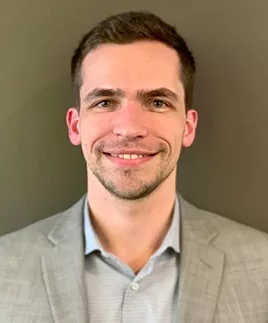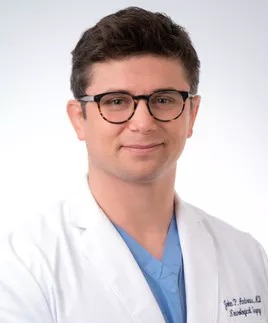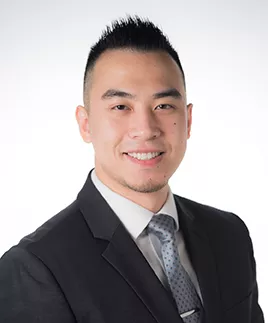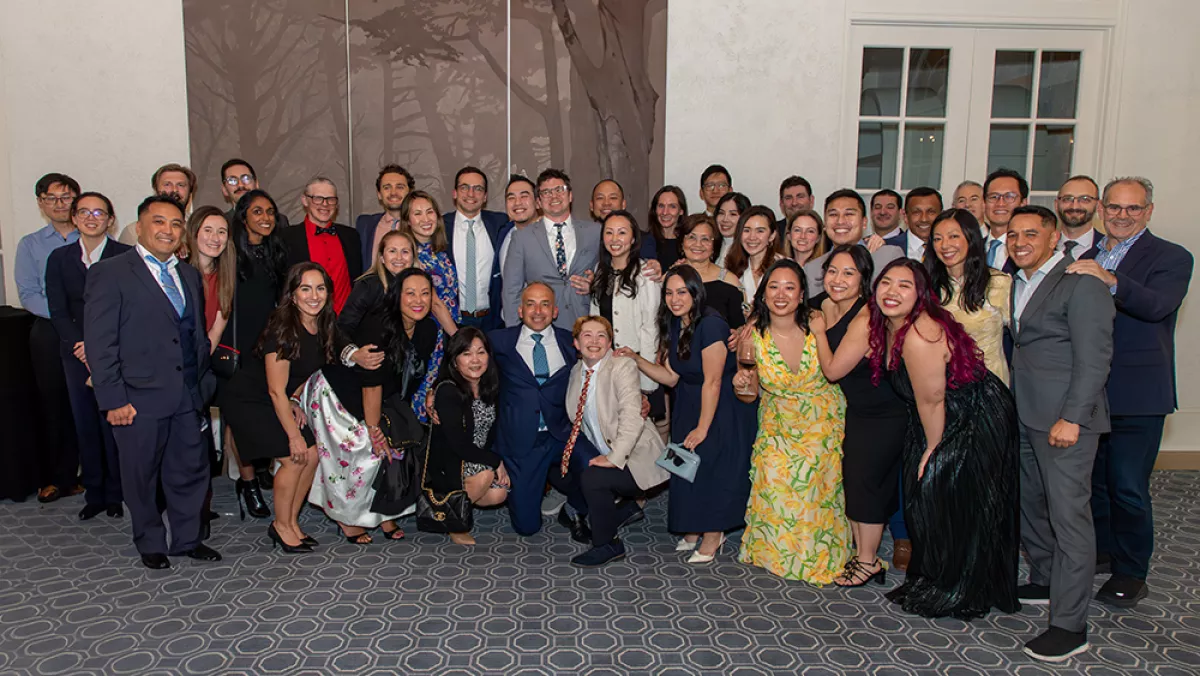The UCSF Neurosurgery Residency Program congratulates our three graduates, who officially completed their seven-year training program in the department on June 21. Our graduating chief residents have already made significant impacts on the field of neurosurgery. Read more about their accomplishments and where they are heading next.
Thomas Wozny, MD

Thomas Wozny, MD, completed his bachelor’s degree in neuroscience as well as his medical degree at the University of Pittsburgh.
As a neurosurgery resident at UCSF, he worked closely with mentors Aaron Clark, MD, PhD, and Philip Starr, MD, PhD. His clinical research interests lie in the neurophysiology of neuropsychiatric conditions and the use of radiomics in prognostication of patient outcomes following spine surgery. During residency, he developed AI-enabled, automated pipelines for tissue segmentation of radiographic scans. Most recently, he has been applying this work to assessments of frailty in patients with adult spinal deformity.
After graduation, he will complete a fellowship in spine neurosurgery at the University of Miami.
Featured publications
Wozny, T. A., Wang, D. D., & Starr, P. A. (2020). Simultaneous cortical and subcortical recordings in humans with movement disorders: Acute and chronic paradigms. NeuroImage, 217, 116904.
Presbrey, K. N., Wozny, T. A., Louie, K. H., Little, S., Starr, P. A., Abbasi-Asl, R., & Wang, D. D. (2025). Motor learning leverages coordinated low-frequency cortico-basal ganglia activity to optimize motor preparation in humans with Parkinson's disease. Frontiers in neuroscience, 19, 1542493.
John Andrews, MD

John Andrews, MD, finished his undergraduate education at the University of Missouri, where he was an NCAA division I wrestler and majored in English. He then earned his medical degree from Yale University. At Yale, he also conducted research studying brain stem arousal pathways in a rodent model of epilepsy in the laboratory of Yale neuroscientist Hal Blumenfeld, MD, PhD through a fellowship supported by the Howard Hughes Medical Institute.
As a neurosurgery resident at UCSF, his clinical focus was on epilepsy, brain tumors, and pediatric neurosurgery. He worked closely with mentors Edward Chang, MD, Mitchel Berger, MD, and Tomasz Nowakowski, PhD. His research has been supported by a National Institutes of Health (NIH) R25 grant. In the Nowakowski lab, he has focused on understanding the physiology of seizure activity in the human brain and developing new tools to manipulate this activity. His work has been recognized by the American Association for Neurosurgeons (AANS) as well as numerous departmental awards. He is also the recipient of the Young Investigator Award from the American Epilepsy Society.
After residency, he will complete a fellowship in pediatric neurosurgery at the Children’s Hospital of Philadelphia.
Featured publications
Andrews, J. P., Geng, J., Voitiuk, K., Elliott, M. A. T., Shin, D., Robbins, A., Spaeth, A., Wang, A., Li, L., Solis, D., Keefe, M. G., Sevetson, J. L., Rivera de Jesús, J. A., Donohue, K. C., Larson, H. H., Ehrlich, D., Auguste, K. I., Salama, S., Sohal, V., Sharf, T., … Nowakowski, T. J. (2024). Multimodal evaluation of network activity and optogenetic interventions in human hippocampal slices. Nature neuroscience, 27(12), 2487–2499.
Andrews, J. P., Cahn, N., Speidel, B. A., Chung, J. E., Levy, D. F., Wilson, S. M., Berger, M. S., & Chang, E. F. (2022). Dissociation of Broca's area from Broca's aphasia in patients undergoing neurosurgical resections. Journal of neurosurgery, 138(3), 847–857.
John Yue, MD

John Yue, MD, received his bachelor’s degree in molecular and cellular biology from UC Berkeley. He then completed his medical degree at UCSF.
As a medical student and then a neurosurgery resident, Yue has been involved in large ongoing national and international neurotrauma clinical trials. His research has focused on advancing the clinical classification system for traumatic brain injury (TBI), validating blood-based biomarkers for TBI diagnosis and prognostication, and refining clinical prediction models for neurotrauma. He worked with Geoffrey Manley, MD, PhD and the neurotrauma leadership to integrate the National Institute of Neurological Disorders and Stroke (NINDS) TBI Common Data Elements (CDE) Initiative as the mainstay for data standardization in the TBI field. He has also served on the expert panel that authored the American College of Surgeons TBI Best Practices Guidelines and is a current member of the NINDS TBI Reclassification and TBI CDE Working Groups.
His research has been supported by the Neurosurgery Research and Education Foundation and a UCSF Catalyst Award. His work has been recognized by San Francisco Neurological Society, the National Neurotrauma Society (NNS), and the AANS/Congress of Neurological Surgeons (CNS) Joint Section on Neurotrauma & Critical Care. He has also received numerous top abstract awards and presented research talks at the national annual meetings of the AANS, CNS, NNS, and other professional organizations.
After graduation, he will remain at UCSF as a core neurotrauma faculty member at Zuckerberg San Francisco General Hospital and Trauma Center and the Weill Institute for Neurosciences.
Featured publications
Yue, J. K., Yuh, E. L., Korley, F. K., Winkler, E. A., Sun, X., Puffer, R. C., Deng, H., Choy, W., Chandra, A., Taylor, S. R., Ferguson, A. R., Huie, J. R., Rabinowitz, M., Puccio, A. M., Mukherjee, P., Vassar, M. J., Wang, K. K. W., Diaz-Arrastia, R., Okonkwo, D. O., Jain, S., … TRACK-TBI Investigators (2019). Association between plasma GFAP concentrations and MRI abnormalities in patients with CT-negative traumatic brain injury in the TRACK-TBI cohort: a prospective multicentre study. The Lancet. Neurology, 18(10), 953–961.
Yue, J. K., Kanter, J. H., Barber, J. K., Huang, M. C., van Essen, T. A., Elguindy, M. M., Foreman, B., Korley, F. K., Belton, P. J., Pisică, D., Lee, Y. M., Kitagawa, R. S., Vassar, M. J., Sun, X., Satris, G. G., Wong, J. C., Ferguson, A. R., Huie, J. R., Wang, K. K. W., Deng, H., … TRACK-TBI Investigators (2024). Clinical profile of patients with acute traumatic brain injury undergoing cranial surgery in the United States: report from the 18-centre TRACK-TBI cohort study. Lancet regional health. Americas, 39, 100915.
Yue, J. K., Lee, Y. M., Sun, X., van Essen, T. A., Elguindy, M. M., Belton, P. J., Pisică, D., Mikolic, A., Deng, H., Kanter, J. H., McCrea, M. A., Bodien, Y. G., Satris, G. G., Wong, J. C., Ambati, V. S., Grandhi, R., Puccio, A. M., Mukherjee, P., Valadka, A. B., Tarapore, P. E., … The TRACK-TBI Investigators (2024). Performance of the IMPACT and CRASH prognostic models for traumatic brain injury in a contemporary multicenter cohort: a TRACK-TBI study. Journal of neurosurgery, 141(2), 417–429.
Menon, D. K., Silverberg, N. D., Ferguson, A. R., Bayuk, T. J., Bhattacharyay, S., Brody, D. L., Cota, S. A., Ercole, A., Figaji, A., Gao, G., Giza, C. C., Lecky, F., Mannix, R., Mikolić, A., Moritz, K. E., Robertson, C. S., Torres-Espin, A., Tsetsou, S., Yue, J. K., Awad, H. O., … Manley, G. T. (2025). Clinical Assessment on Days 1-14 for the Characterization of Traumatic Brain Injury: Recommendations from the 2024 NINDS Traumatic Brain Injury Classification and Nomenclature Initiative Clinical/Symptoms Working Group. Journal of neurotrauma, 10.1089/neu.2024.0577. Advance online publication.

